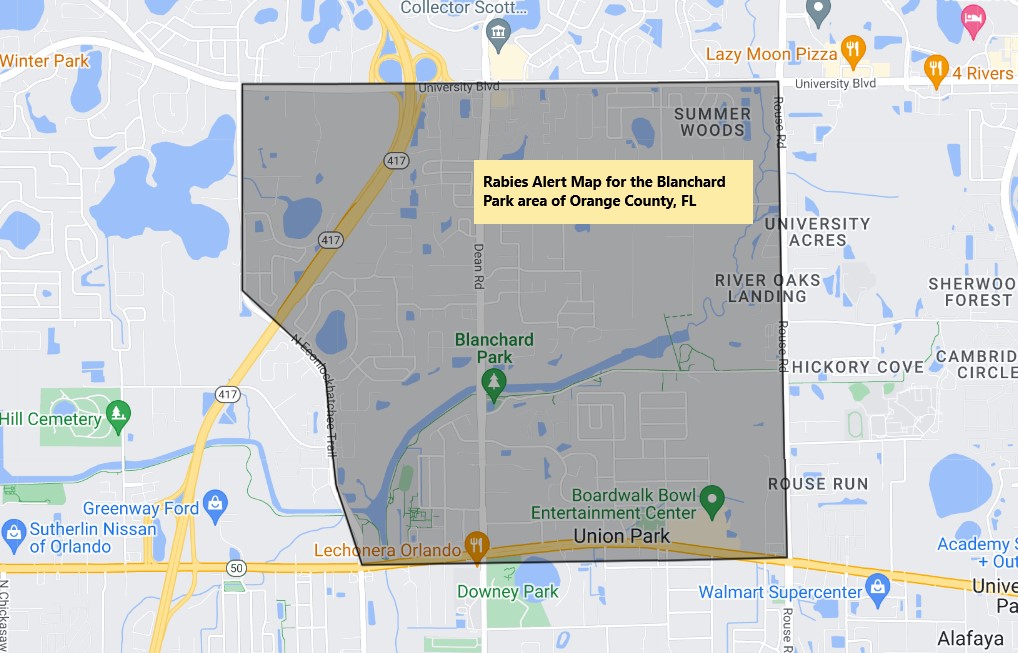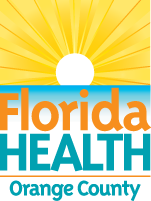It's a New Day in Public Health.
The Florida Department of Health works to protect, promote, and improve the health of all people in Florida through integrated state, county, and community efforts.
HEALTH OFFICIALS ISSUE RABIES ALERT
October 23, 2023

Contact:
Kent Donahue
Kent.Donahue@flhealth.gov
407-858-1418
ORLANDO, FL – The Florida Department of Health in Orange County has issued a rabies alert for the Blanchard Park area of Orange County, Florida. The alert is for 60 days and is in response to a raccoon that tested positive on October 21, 2023.
There have been three positive wild raccoons confirmed within the last three months, with one exposure leading to the death of a domestic canine. The most recent positive animal exposed a domestic canine in an additional part of Orange County. We encourage pet owners to ensure their pets are up-to-date on rabies vaccinations.
All residents and visitors in Orange County should be aware that rabies is present in the wild animal population and domestic animals are at risk if not vaccinated. The public is asked to maintain a heightened awareness that rabies is active in Orange County.
The following is the Rabies Alert area:
North of State Road 50 (Colonial Drive)
East of Econlockhatchee Trail
West of Rouse Road
South of University Blvd.
Please be aware that rabies activities can also occur outside the alert area. Contact with feral cats, stray dogs and all wildlife particularly raccoons, bats, foxes, skunks, otters, bobcats and coyotes should be avoided.
If you or a family member has been bitten or scratched by an animal in the rabies alert area of Orange County or any animal, you should seek medical attention immediately and contact Orange County Animal Services at 407-836-3111.
An animal with rabies could infect domestic animals that have not been vaccinated against rabies. All domestic animals should be vaccinated against rabies and all wildlife contact should be avoided, particularly raccoons, bats, foxes, skunks, otters, bobcats, and coyotes.
Rabies is a disease of the nervous system and is fatal to warm blooded animals and humans. The only treatment for human exposure to rabies is rabies specific immune globulin and rabies immunization. Appropriate treatment started soon after the exposure will protect an exposed person from the disease.
Residents and visitors are advised to take the following precautions:
- All pets and at-risk livestock should have current rabies immunizations.
- Secure outside garbage in covered containers to avoid attracting wild animals.
- Do not leave pet food outside.
- Avoid contact with all wildlife, especially feral cats, raccoons, bats, and foxes.
- If bitten or scratched by a suspected rabid animal, wash the wound immediately with soap and water, seek medical attention, and promptly report the incident to Orange County Animal Services 407-836-3111.
- Rabies is preventable when treatment is provided in a timely manner.
- Do not allow your pets to run free. Follow leash laws by keeping pets and livestock secured on your property. If your pet or livestock are bitten by a wild animal, seek veterinary assistance for the animal immediately and contact Orange County Animal Services at 407-836-3111.
- Support animal control in efforts to reduce feral and stray animal populations.
- Spay or neuter your pets to help reduce the number of unwanted pets that may not be properly cared for or regularly vaccinated.
- Do not handle, feed, or unintentionally attract wild animals with outdoor food sources such as uncovered trash or litter.
- Never adopt wild animals or bring them into your home.
- Teach children to never handle unfamiliar animals, wild or domestic, even if they appear friendly.
- Prevent bats from entering living quarters or occupied spaces in homes, churches, schools, and other similar areas, where they might come in contact with people and pets.
For general questions pertaining to animals, contact Orange County Animal Services 407-254-9150. For more information on rabies, visit the DOH website at doh.state.fl.us/Environment/medicine/rabies/rabies-index.html, the CDC website at www.cdc.gov/ncidod/dvrd/rabiesor contact the Florida Department of Health in Orange County at 407-858-1420.
About the Florida Department of Health
The department, nationally accredited by the Public Health Accreditation Board, works to protect, promote, and improve the health of all people in Florida through integrated state, county, and community efforts. Follow us on Twitter at @HealthyFla and on Facebook. For more information about the Florida Department of Health please visit www.FloridaHealth.gov.




Connect with DOH